
Blog post #3 (March 2025)
C-NEWTRAL doctoral candidates prepare for all levels of citizen engagement!
Learn about the doctoral candidates' experience during their little meet cute!
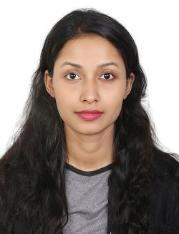
Zannat Ara Ghani is a doctoral researcher under the C-NEWTRAL doctoral network funded by the prestigious Marie Sklodowska-Curie Actions (MSCA) in the University of Helsinki. Her research topic is “Citizen Science for Urban Nature Regeneration Processes”.
The C-NEWTRAL doctoral network project coordinators and participants along with the 12 Doctoral Candidates (DCs) gathered for the first time in-person during the Work Package 3 Citizen Engagement training organized in Girona, Spain. The city is in the northeastern part of Catalonia, Spain, is known for its stunning Roman, medieval Romanesque and Baroque architecture and its picturesque streets that transport you to another era. Some of you might recognise the Girona Cathedral (pictured in the background below) as the “Great Sept of Baelor” from the famous Game of Thrones series or the beautiful old town in the “Slowly Slowly Catchy Monkey” episode of “Killing Eve.” For someone coming from a distant land, experiencing the real-life locations of my favourite TV series felt like a dream come true.
Now coming back to serious talk!
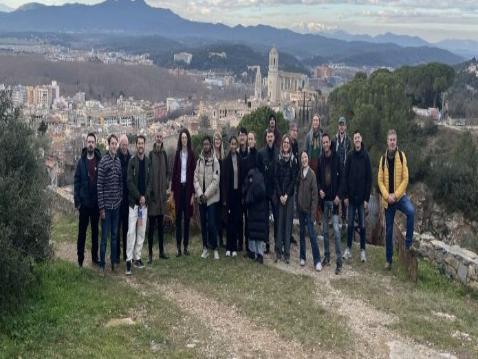
C NEWTRAL doctoral candidates and supervisors on top of Les Pedreres mountain with the Girona cathedral in the background.
The 5-day program started with a dinner on the 19th of January 2025 where all the doctoral candidates and their respective supervisors met participants from other universities. The training commenced the next day with a welcoming speech by Aura Istrate, the C-NEWTRAL Primary Coordinator followed by presentations from six DCs whose work focuses particularly on bottom-up citizen engagement in various aspects of the sustainable transition, such as nature, mobility, energy etc. The training programme had a unique balance between real life examples of citizen engagement in nature regeneration, such as those demonstrated by the (opens in a new window)Milfulles Association, a local community association of nature enthusiasts and the theoretical aspects behind such initiatives, ensured by the participation of organizations like (opens in a new window)Heidelberg University, (opens in a new window)WILA Bonn and (opens in a new window)GeoDesignHub.
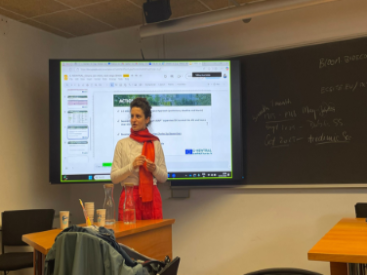
Aura Istrate, Assistant Professor, University College Dublin, Ireland welcoming the training participants.
Visit to Parc de les Pedreres
On day 1, our guides Enric Cassú, from the Milfulles Association, and Marc Rosdevall from the City of Girona, organized an excursion to “Les Pedreres” park, on top of a hill overseeing the city from where we enjoyed the scenic panoramic view of beautiful Girona. Les Pedreres is a particularly critical area for the city of Girona, home to a rich mediterranean forest with numerous native tree species. It also holds a (opens in a new window)great historic significance due to the ruins of Fort Calvary, which was destroyed during the French siege of 1809. The city plans to develop a cohesive urban park named “(opens in a new window)Parc de les Pedreres” where visitors and residents can take “ethnobotanical walks” around the city freely and safely. Along the route of the proposed walk, we were shown some examples of the bottom-up conservation initiatives undertaken to date by Milfulles in collaboration with the City of Girona.
However, the city faces significant challenges, central among which is a dispute with the residents of long-established informal settlements in the area. These settlements established in the 1960s, are located on public land which the city now intends to incorporate into Parc de les Pedreres. Also fire hazard, accumulation of waste (remains of marijuana crops), abandoned vehicles are some of the (opens in a new window)emerging concerns prevailing in the Les Pedreres area.
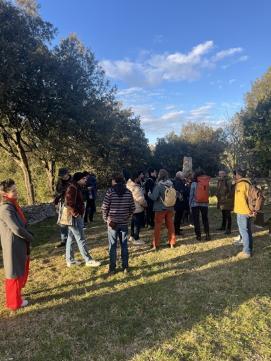
Marc Rosdevall from the Girona City Council describing local community initiatives.
Playful observation of Jardines de les Pedreres
On day 2, we visited Jardines de les Pedreres, an urban park adjacent to the historic city walls of Girona. Part of the “GiroNat” project, an ongoing initiative by Girona City Council to make the city more inclusive, environmentally just, and climate resilient, the park was recently the subject of a community consultation aimed at improving its natural amenity and thus bringing it into wider use among residents.
As an exercise, we were given the task of observing the park for a brief period during the day and reporting on what we recorded. What seemed at first like a playful observation exercise turned into a valuable learning experience, illustrating how different participants, each drawing from their own educational and professional backgrounds, can perceive a problem differently, and thus highlighting the importance of including diverse perspectives and actors in such projects. For example, Shahid Ali and Tzuhsiang Lo, expertise with water, scrutinized challenges related to storm water runoff; Yanxia Qiu focused more on the landscape design because of her landscape architect background and Alireza Adergani noticed the lack of inclusive transport route surrounding the park as he is working with mobility.
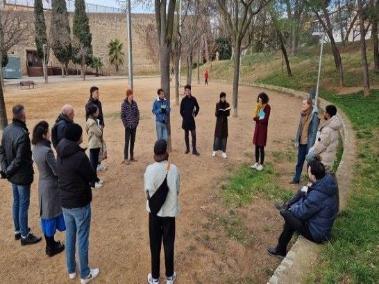
Participants sharing their observations of the Jardines de les Pedreres.
The LEGO challenge
Back in the classroom, we learnt about the theoretical and methodological aspects of conducting citizen science with sessions organised by Heidelberg University and WILA Bonn. Caroline Walter & Ulrikke Gerhard from the Heidelberg University displayed some marvellous examples of citizen engagement projects that have transpired in Germany, especially in the city of Heidelberg. Meanwhile, Norbert Steiner from WILA Bonn delved deeper into the history, diverse types, and principles of traditional in-person citizen engagement tools. Norbert had us undertake the ‘LEGO challenge’ in which two teams race to complete a series of conflicting building tasks in total silence. This helped us understand the importance of inclusion, cooperation, and the challenges of executing a plan without any discussion with different stakeholders.
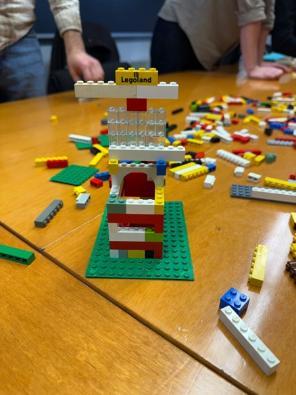
The Legoland created by one of the groups in the LEGO challenge.
Digital inclusion with decision support tools
On the final two days, Hrishikesh Ballal from Dublin-based GeoDesignHub, guided us using his digital platform as a decision support tool in complex, multi-party negotiations. GeoDesign allows decisions taken by diverse stakeholders to be dissected into smaller parts, facilitating negotiation. Decision-makers can prioritise achieving the non-negotiable parts of the solutions in a democratic way. We applied our observation of the Les Pedreres from day 1 for a hands-on exploration of the various interactive functions the GeoDesignHub platform has to offer – and we came remarkably close to solving the problems that have been ongoing for 70 years! No way, just kidding!
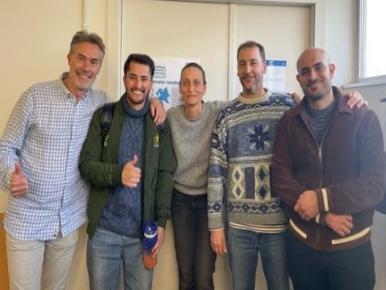
The organizers and students from the University of Girona (From left: Dr. Joaquim Comas, Shahid Ali, Dr. Alexandra Popartan, Dr. Ignasi Rodriguez-Roda Layret and Oussama Chaabounii)
Final word
Overall, the training organizers from the University of Girona were very dedicated to providing the best experience to the doctoral candidates, creating lifelong memories. This reflected on the planning of the training, thoughtful selection of the case study examples, the choice of the restaurants and foods (the quinoa salad was amazing!) and the warm hospitality (and patience!) they extended throughout the week.
We the DCs, a certified bunch of nerds, also had a lot of fun by ourselves. Especially on the last day of the training, we went to explore the ‘great wall’ of Girona (Muralles de Girona) surrounding the old city and enjoyed the beautiful sunset there. It was an amazing experience!
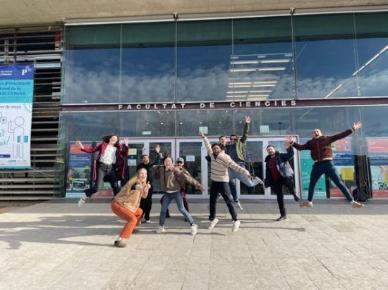
The doctoral candidates in front of the Faculty of Sciences, University of Girona.
Upon asking about the main takeaway from the training, Shantanu Raut replied “The workshop provided valuable insights into methods like co-creation, focus groups, and mapping, with a strong focus on engaging vulnerable groups in climate change research.”
Roisin Cahill added “I'm struggling to condense the week into one key learning, maybe it's about the benefit of doing a PhD in a network. There's so much to learn from other DCs going through the same process, discussing the work with a range of disciplines helps to highlight new aspects and ways of thinking about the project.”
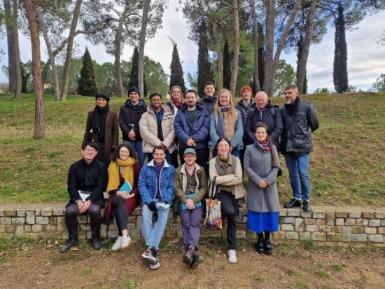
A group photograph of the C-NEWTRAL team.
With thanks to Shantanu Raut and Shane Sugrue for their proofreading the text and insightful suggestions!